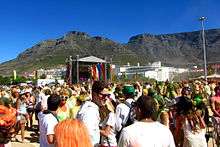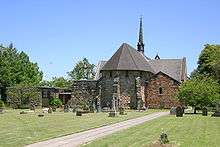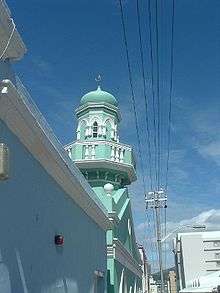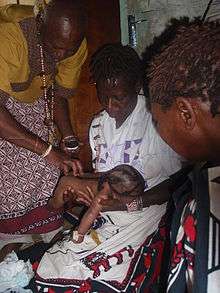Religion in South Africa
Religion in South Africa is dominated by various branches of Christianity. South Africa is a secular state with a diverse religious population. Its constitution guarantees freedom of religion. Many religions are represented in the ethnic and regional diversity of the population.
Religion in South Africa (2016 Community Survey)[1]



History
A diverse variety of African Traditional Religions of the early Khoisan and later Bantu speakers were practiced in the region prior to contact with European seafarers and settlers. The first symbols of Christianity in southern Africa were in the form of crosses planted along the coast by early Portuguese seafarers. With the establishment of a trading post at the Cape of Good Hope by the Dutch in 1652, Christianity obtained a permanent foothold and gained converts among the indigenous population. This was reinforced by the arrival of the French Huguenots shortly thereafter. After the British occupations of the Cape in 1795 and 1806, this Christian tradition prevailed.
During the twentieth century the majority of people from European descent were Christian Protestants.
Islam was introduced by the Cape Malay slaves of the Dutch settlers, Hinduism was introduced by the indentured labourers imported from the Indian subcontinent, and Buddhism was introduced by both Indian and Chinese immigrants.
Judaism in South Africa came about some time before the discovery of the Cape of Good Hope, by the participation of Jewish astronomers and cartographers in the Portuguese discovery of the sea-route to India. They assisted Bartolomeu Dias and Vasco da Gama who first sailed around the Cape of Good Hope in 1488 and 1497 respectively. However, Jewish settlers only began to arrive in numbers from the 1820s.
The Bahá'í Faith was introduced in 1911.[2] The Bahá'í community decided to limit membership in its national assembly to black adherents when a mixed-race assembly was prohibited under Apartheid. It has about 250,000 members.[3]
The socially marginalized African Traditional Religion adherents have become more publicly visible and organised in a democratic post-apartheid South Africa and today number over 6 million, or approximately 15 percent of the population.[4]
Demographics
Census Information
The Census 2001 provided the most recent national statistics for religious denominations.[5][6][7] The Census 2011 form did not include any questions about religion due to low priority.[8] The 2016 Community Survey, and intercensal survey carried out by Statistics South Africa, reintroduced the religion question, and the results were reported in the pie chart.
| Religion[7] | Denomination | 1996 | 2001 | Change in % | ||
|---|---|---|---|---|---|---|
| Adherents | % | Adherents | % | |||
| Christian | Subtotal | 30,051,008 | 75.5 | 35,765,251 | 79.8 | |
| Dutch Reformed churches | 3,527,075 | 8.9 | 3,005,698 | 6.7 | ||
| Zion Christian churches | 3,867,798 | 9.7 | 4,971,932 | 11.1 | ||
| Catholic churches | 3,426,525 | 8.6 | 3,181,336 | 7.1 | ||
| Methodist churches | 2,808,649 | 7.1 | 3,305,404 | 7.4 | ||
| Pentecostal/Charismatic churches | 2,204,171 | 5.5 | 3,422,749 | 7.6 | ||
| Anglican churches | 1,600,001 | 4.0 | 1,722,076 | 3.8 | ||
| Apostolic Faith Mission | 1,124,066 | 2.8 | 246,190 | 0.5 | ||
| Lutheran churches | 1,051,193 | 2.6 | 1,130,987 | 2.5 | ||
| Presbyterian churches | 726,936 | 1.8 | 832,495 | 1.9 | ||
| iBandla lamaNazaretha | 454,760 | 1.1 | 248,824 | 0.6 | ||
| Baptist churches | 439,680 | 1.1 | 691,237 | 1.5 | ||
| Congregational churches | 429,868 | 1.1 | 508,825 | 1.1 | ||
| Orthodox churches | 33,665 | 0.1 | 42,251 | 0.1 | ||
| Other Apostolic churches | 3,517,059 | 8.8 | 5,609,070 | 12.5 | ||
| Other Zionist churches | 2,159,257 | 5.4 | 1,887,147 | 4.2 | ||
| Ethiopian type churches | 800,897 | 2.0 | 880,414 | 2.0 | ||
| Other Reformed churches | 386,456 | 1.0 | 226,495 | 0.5 | ||
| Other African independent churches | 229,038 | 0.6 | 656,644 | 1.5 | ||
| Other Christian churches | 1,263,914 | 3.2 | 3,195,477 | 7.1 | ||
| Non-Christian | Subtotal | 1,369,986 | 3.4 | 1,676,391 | 3.7 | |
| Other non-Christian religions | 193,830 | 0.5 | 269,200 | 0.6 | ||
| Islam | 553,585 | 1.4 | 654,064 | 1.5 | ||
| Hinduism | 537,428 | 1.4 | 551,669 | 1.2 | ||
| African Traditional Religion | 17,085 | 0.0 | 125,903 | 0.3 | ||
| Judaism | 68,058 | 0.2 | 75,555 | 0.2 | ||
| No religion/not stated | Subtotal | 8,385,603 | 21.1 | 7,378,137 | 16.5 | |
| No religion | 4,638,897 | 11.7 | 6,767,165 | 15.1 | ||
| Not stated | 3,746,706 | 9.4 | 610,971 | 1.4 | ||
| Total | 39,806,597 | 100 | 44,819,778 | 100 | ||
Other Estimates
A 2012 Win-Gallup International Religiosity and Atheism poll indicated that the number of South Africans who consider themselves religious decreased from 83% of the population in 2005 to 64% of the population in 2012.[9] However, an Ipsos Mori Poll of 2017 showed 88% declare that religion was an important part of their lives.[10]
A 2015 study estimated some 6,500 believers from a Muslim background have converted into Christianity and numbers have increased recently.[11]
The Association of Religion Data Archives (relying on World Christian Trends) estimated in 2010 that 82.0% of South Africans identified as Christian, 7.1% identified with indigenous religions, 5.4% identified as agnostic, 2.4% identified as Hindu, 1.7% identified as Muslim, 0.5% identified as Bahá'í, 0.3% each identified as Buddhist and atheist, 0.2% identified as Jewish, and less than 0.1% identified with each other group.[12]
According to the World Values Survey, between 1981 and 2001, South Africa was one of only three societies to see an increase in religious participation, and it was the leader among these, with churchgoing increasing by 13% in that period, from 43% of people surveyed to 57% being churchgoers.[13]
Individual Religions

Christianity
| Christian denominations in South Africa |
|---|
Christianity is the dominant religion in South Africa, with almost 80% of the population in 2001 professing to be Christian. No single denomination predominates, with mainstream Protestant churches, Pentecostal churches, African initiated churches, and the Catholic Church all having significant numbers of adherents. Importantly, there is significant and sustained syncretism with African Traditional Religion among most of the self-professed Christians in South Africa.[14] Of the total national population of 44.8 million, 35.8 million or 79.8% identified as members of a Christian denomination.[15]
Protestantism
The history of Protestantism in South Africa dates back to the initial European settlement on the Cape of Good Hope in 1652. Since then, Protestantism has been the predominant religion of the European settlers and today, of South Africa as a whole. The largest Protestant denomination in the country is Pentecostalism, followed by Methodism, Dutch Reformed and Anglicanism.
Zion Christian Church
The Zion Christian Church (or ZCC) is the largest African initiated church in Southern Africa. The church's headquarters are at Zion City Moria in Limpopo Province, South Africa (Northern Transvaal).
According to the 1996 South African Census, the church numbered 3.87 million members. By the 2001 South African Census, its membership had increased to 4.97 million members.[7] (More recent official statistics are unavailable, since the last South African Census – 2011 – did not ask any questions about religious affiliation.)
Catholic Church
The Catholic Church in South Africa is part of the universal Catholic Church composed of the Roman Rite and 22 Eastern Rites, of which the South African church is under the spiritual leadership of the Southern African Catholic Bishops Conference and the pope based in Vatican City. It is made up of 26 dioceses and archdioceses plus an apostolic vicariate.
In 1996, there were approximately 3.3 million Catholics in South Africa making up 6% of the total South African population. Currently, there are 3.8 million Catholics.[16] 2.7 million are of various black African ethnic groups, such as Zulu, Xhosa, and Sotho. Coloured and white South Africans each account for roughly 300,000.[17] Most white Catholics are English speaking. The majority are descended from Irish and Italian immigrants. Many others are Portuguese settlers who left Angola and Mozambique after they became independent in the 1970s, or their children. The proportion of Catholics among the predominantly Calvinist white Afrikaans speakers, or South African Asians who are mainly Hindus of Indian descent, is extremely small.
Islam
Islam in South Africa is a minority religion, practiced by less than 1.5% of the total population, according to estimates . It has grown in three phases. The first phase brought the earliest Muslims as part of the involuntary migration of slaves, political prisoners and political exiles from Africa and Asia (mainly from the Indonesian archipelago) that lasted from about 1652 to the mid-1800s. The second phase was the arrival of Indians as indentured laborers to work in the sugar-cane fields in Natal between 1860 and 1868, and again from 1874 to 1911. Of the approximately 176,000 Indians of all faiths who were transported to the Natal province, almost 7-10% of the first shipment were Muslims.
The third phase, following the end of Apartheid, has been marked by the wave of African Muslims that have arrived on the shores and borders of South Africa. Recent figures estimate the number as between 75,000 and 100,000. Added to this are a considerable number of Muslims from India and Pakistan that have arrived as economic migrants.[18] Although, the majority of South African Muslims are Sunni, smaller numbers are Ahmadi, particularly in Cape Town.[19]
The Auwal or Owal Mosque built in 1794, is a mosque in the Bo-Kaap neighbourhood of Cape Town, South Africa, it is recognised as the first mosque established in the country. It is also believed that Sheikh Yusuf of Macassar was the first person to introduce the Quran in South Africa.
Hinduism
Hinduism is found in various provinces of South Africa, but primarily in KwaZulu-Natal. Approximately 1.22% or 551,669 of the South African population professed to be Hindu, according to the 2001 census.[20] This is the largest concentration of Hindus in Africa after Mauritius.
It is unclear when the first Hindus settled in parts of South Africa. The vast majority of current Hindus in South African provinces are descendants of indentured laborers brought in by the British colonial government, from 1860 to 1919, to work in plantations and the mining operations owned by European settlers.[21] Many came from Tamil Nadu, Gujarat, Maharashtra, Uttar Pradesh, and Bihar, and some from other states of India. Early Hindu settlements in South Africa suffered discrimination, abuse and persecution.[22][23] Hindu Indians were among the people who were referred to as coolies,[24] racially segregated, and their discrimination continued through the Apartheid era until 1994.
The first Hindu temples were in operation in the 1870s. Some South African local governments banned temple building and property ownership by Hindus in 1910s.[25] Modern South Africa has many Hindu temples, and its Hindu community observes major festivals of Hinduism such as Deepavali.[26]
Bahá'í Faith
The Bahá'í Faith in South Africa began with the holding of Bahá'í meetings in the country in 1911.[27] A small population of Bahá'ís remained until 1950 when large numbers of international Bahá'í pioneers settled in South Africa. In 1956, after members of various tribes in South Africa became Bahá'ís, a regional Bahá'í Assembly which included South Africa was elected. Later each of the constituent countries successively formed their own independent Bahá'í National Spiritual Assembly. Then in 1995, after a prolonged period of growth and oppression during Apartheid and the homelands reuniting with South Africa, the Bahá'í National Spiritual Assembly of South Africa was formed. In 2005 Bahá'ís were estimated at about 240,100 adherents.[28]
Judaism
The history of the Jews in South Africa mainly began under the British Empire, following a general pattern of increased European settlement in the 19th century. The early patterns of Jewish South African history are almost identical to the history of the Jews in the United States but on a much smaller scale, including the period of early discovery and settlement from the late 17th century to the early 19th century. The community grew tenfold between 1880 and 1914, from 4,000 to over 40,000. During apartheid, a number of Jews were prominent in the Anti-Apartheid Movement, while others were instrumental in promoting the extension of diplomatic military ties between Israel and the country's white government.[29] South Africa's Jewish community differs from its counterparts in other African countries in that the majority have remained on the continent rather than emigrating to Israel (62% of the maximum 120,000 still remain). Among potential Jewish emigrants, many were likelier to select a destination popular among other South Africans, such as Australia.[30]
Legislation
| Part of a series on the |
| Culture of South Africa |
|---|
 |
| History |
| People |
| Cuisine |
|
Festivals |
| Religion |
| Art |
|
Media |
| Sport |
|
Monuments |
|
Post-apartheid South Africa's Constitution guarantees the right to freedom of religion, belief and opinion among other freedoms. The Commission for the Promotion and Protection of the Rights of Cultural, Religious and Linguistic Communities (CRL Rights Commission) is a chapter nine institution established in 2004 to support democracy.[31][32]
The new Constitution did not result in immediate reform of discriminatory legislation infringing on the right to religious freedom. Various legislative reforms have taken place or have been initiated since 1994 as a result of lobbying by disenfranchised groups.
The Civil Union Act, which came into effect on 30 November 2006, legalised same-sex marriage and also allowed for the legal designation of religious marriage officers without any religious restriction in accordance with the Constitution. Previously, religious marriage officers could only be legally designated as such "for the purpose of solemnising marriages according to Christian, Jewish or Mohammedan rites or the rites of any Indian religion" in accordance with the Marriage Act. In accordance with section 5 of the Civil Union Act, any religious organisation may apply to the Department of Home Affairs for designation as a religious organisation and when designated as such must formally nominate suitable candidates from within their organisation to be designated by the Department of Home Affairs as religious marriage officers for the purpose of solemnising marriages according to the rites of that religious organisation.[33]
The Witchcraft Suppression Act of 1957 based on colonial witchcraft legislation criminalises claiming a knowledge of witchcraft, conducting specified practices associated with witchcraft including the use of charms and divination, and accusing others of practising witchcraft.[34] In 2007 the South African Law Reform Commission received submissions from the South African Pagan Rights Alliance and the Traditional Healers Organisation requesting the investigation of the constitutionality of the act and on 23 March 2010 the Minister of Justice and Constitutional Development approved a South African Law Reform Commission project to review witchcraft legislation.[35][36]
One of the SALRC's other new projects, the review of witchcraft legislation, will support the constitutional guarantee to freedom of religion, but will also serve to protect vulnerable groups. It is mostly women advanced in age that are persecuted as witches by communities holding traditional beliefs. These innocent victims are vulnerable to a double degree: as women and as older persons.
— South African Law Reform Commission Thirty Eighth Annual Report 2010/2011[37]
The Christian holidays of Christmas Day and Good Friday remained in post-apartheid South Africa's calendar of public holidays. The CRL Rights Commission held countrywide consultative public hearings in June and July 2012 to assess the need for a review of public holidays following the receipt of complaints from minority groups about unfair discrimination. The CRL Rights Commission stated that they would submit their recommendations to the Department of Home Affairs, the Department of Labour, various Portfolio Committees and the Office of the Presidency.[38][39]
See also
References
- "South Africa - Community Survey 2016". www.datafirst.uct.ac.za. Retrieved 25 November 2018.
- National Spiritual Assembly of the Bahá'ís of South Africa (2014). "History of the Baha'i Faith in South Africa". Official Website. National Spiritual Assembly of the Bahá'ís of South Africa. Archived from the original on 22 September 2017. Retrieved 29 March 2016.
- Salma Xiater. Bahai Faith: A Complete Guide. pp. 112–13.
- Wallace, Dale (2006). The Construction and Articulation of a Pagan Identity in South Africa: A Study of the Nature and Implications of a Contested Religious Identity in a Pluralistic Society (PhD). University of KwaZulu-Natal. Archived from the original on 21 April 2013. Retrieved 2 November 2012.
- "Table: Census 2001 by province, gender, religion recode (derived) and population group". Census 2001. Statistics South Africa. Archived from the original on 30 November 2006. Retrieved 27 April 2009. Select all 26 religions, click "Continue".
- Religion codes in the 2001 census data
- Census 2001: Primary Tables: Census '96 and 2001 compared (PDF). Pretoria: Statistics South Africa. 2004. pp. 25–28. ISBN 0-621-34320-X. Archived from the original (PDF) on 20 December 2014. Retrieved 1 December 2014.
- "Census 2011 Frequently Asked Questions (FAQ)". statssa.gov.za. Archived from the original on 24 May 2012. Retrieved 22 October 2012.
- "Fewer religious people in SA – survey". news24.com. 10 August 2012. Retrieved 2 November 2012.
- "Importance of Religion or Faith". Archived from the original on 12 June 2018. Retrieved 9 May 2017.
- Johnstone, Patrick; Miller, Duane (2015). "Believers in Christ from a Muslim Background: A Global Census". IJRR. 11: 14. Retrieved 6 December 2015.
- "South Africa". The Association for Religion Data Archives. Retrieved 29 March 2016.
- Norris, Pippa; Inglehart, Ronald (2011). Sacred and Secular: Religion and Politics Worldwide. United States of America: Cambridge University Press. pp. 74. ISBN 978-1-107-01128-1.
- http://ir.lib.uwo.ca/cgi/viewcontent.cgi?article=1107&context=totem
- "South Africa's people" (PDF). Pocket Guide to South Africa (2011/2012 ed.). Government of South Africa. p. 12. Retrieved 4 April 2012.
- GCatholic.org
- Catholics in RSA 1996 census statistics posted on the website of the Archdiocese of Bloemfontein.
- Faizal Dawjee. "Muslims in the Struggle". Retrieved 24 May 2013.
- Abdulkader Tayob. Islamic Resurgence in South Africa: The Muslim Youth Movement. p. 104. Retrieved 31 May 2014.
- "South Africa - Section I. Religious Demography". U.S. Department of State. Retrieved 15 July 2006.
- "Forced Labour". The National Archives, Government of the United Kingdom. 2010.
- R Huttenback (1976), Racism and Empire: White Settlers and Colored Immigrants in the British Self-Governing Colonies 1830-1910, Cornell University Press, ISBN 978-0801409745
- Michelangelo van Meerten, in History of Humanity: Scientific and Cultural Development, Editors: Peter Mathias and Nikolaj Tolorov, Volume 6, Originally published by UNESCO, Re-published by Routledge, ISBN 0-415-09310-4, pp. 72-75
- Marina Carter and Khal Torabully (2002), Coolitude, Anthem Press, ISBN 1-84331-0031
- Bhana and Brain (1990), Setting down roots: Indian Migrants in South Africa, 1860-1911, Johannesburg, Witwatersrand University Press
- P.P. Kumar (2012), Hinduism in South Africa, in Elias Kifon Bongmba (Editor) - The Wiley Blackwell Companion to African Religions, ISBN 978-1405196901
- National Spiritual Assembly of the Bahá'ís of South Africa (2014). "History of the Baha'i Faith in South Africa". Official Website. National Spiritual Assembly of the Bahá'ís of South Africa. Archived from the original on 22 September 2017. Retrieved 29 March 2016.
- "Most Baha'i Nations (2005)". QuickLists > Compare Nations > Religions >. The Association of Religion Data Archives. 2005. Retrieved 4 July 2009.
- "P.W. Botha felt Israel had betrayed him". Jerusalem Post. 2 November 2006. Retrieved 2 November 2006.
- "World Jewish Population - Latest Statistics". Retrieved 5 April 2016.
- "Chapter 9 – State institutions supporting constitutional democracy". info.gov.za. Archived from the original on 4 September 2012. Retrieved 2 November 2012.
- "Investigation and Conflict Resolution (ICR)". crlcommission.org.za. Archived from the original on 31 January 2013. Retrieved 2 November 2012.
- Civil Union Act 17 of 2006 Archived 9 May 2012 at the Wayback Machine
- Witchcraft Suppression Act 3 of 1957
- "Sapra Appeal for legislative reform". vuya.net. 10 July 2007. Archived from the original on 20 December 2012. Retrieved 2 November 2012.
- Department of Justice and Constitutional Development. "Current Investigations: Progress Report; Project 135: Review of witchcraft legislation". justice.gov.za. Retrieved 2 November 2012.
- "South African Law Reform Commission Thirty Eighth Annual Report 2010/2011" (PDF). justice.gov.za. Retrieved 2 November 2012.
- "crl rights commission continues with the consultative community hearings on the possible review of public holidays". info.gov.za. 26 June 2012. Archived from the original on 10 March 2013. Retrieved 2 November 2012.
- "Fight over religious holidays". crlcommission.org.za. Archived from the original on 18 October 2014. Retrieved 2 November 2012.
Further reading
- Stephen Offutt, New Centers of Global Evangelicalism in Latin America and Africa (Cambridge University Press, 2015) focuses on El Salvador and South Africa. online review
- C. Jeannerat, D. Péclard & E. Morier-Genoud, Embroiled. Swiss churches, South Africa and Apartheid, Berlin: LIT Verlag (Coll. “Schweizerische Afrikastudien/Études africaines suisses”), 2011